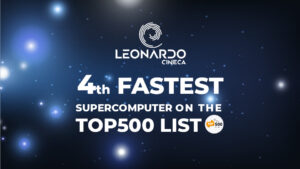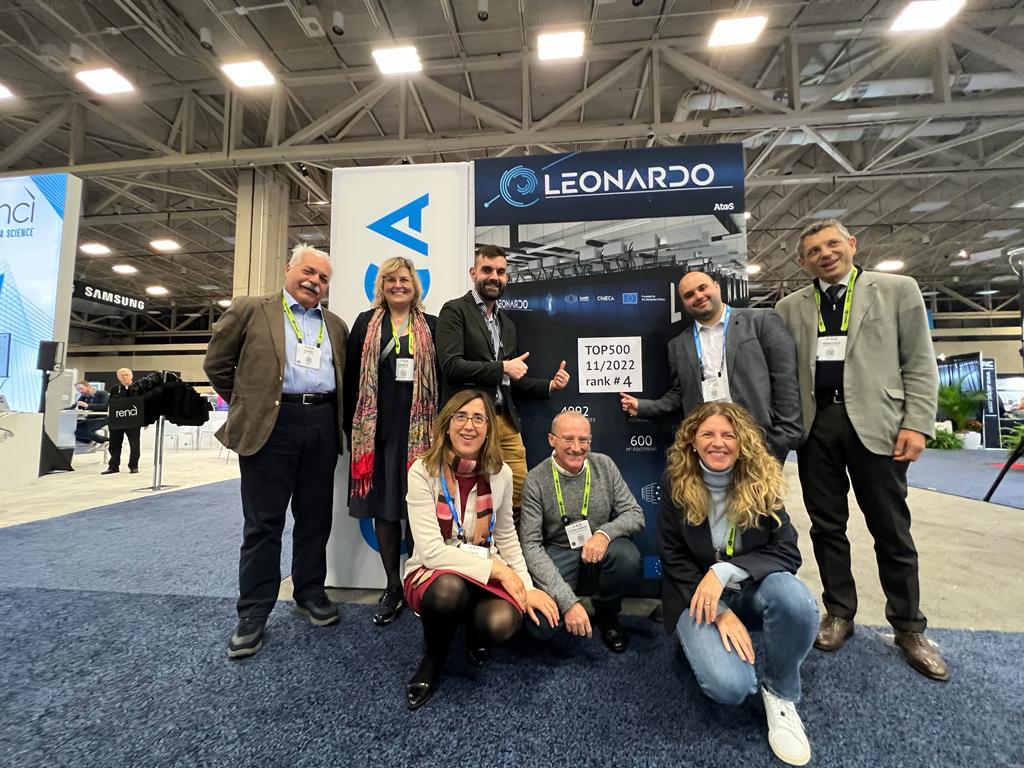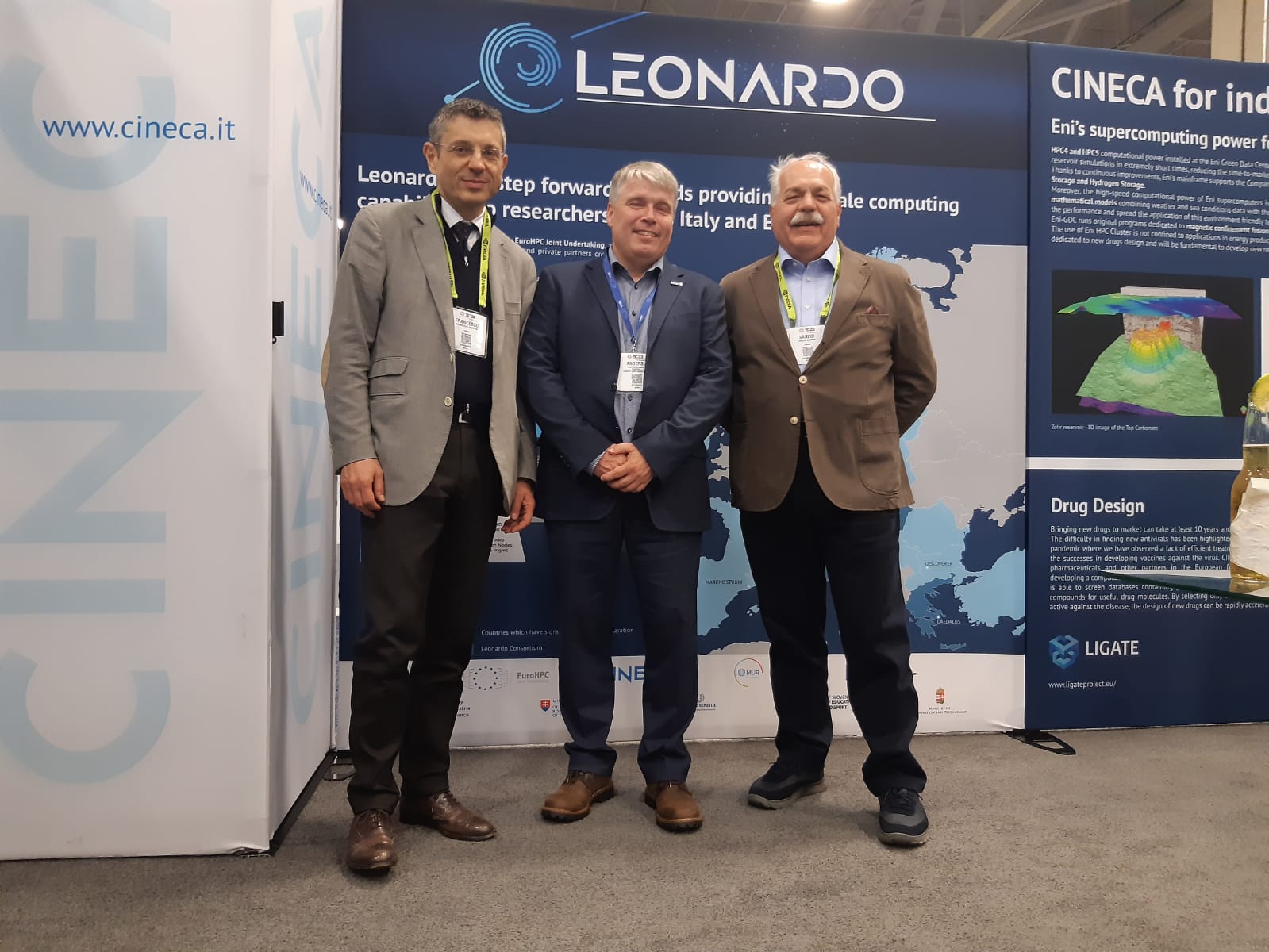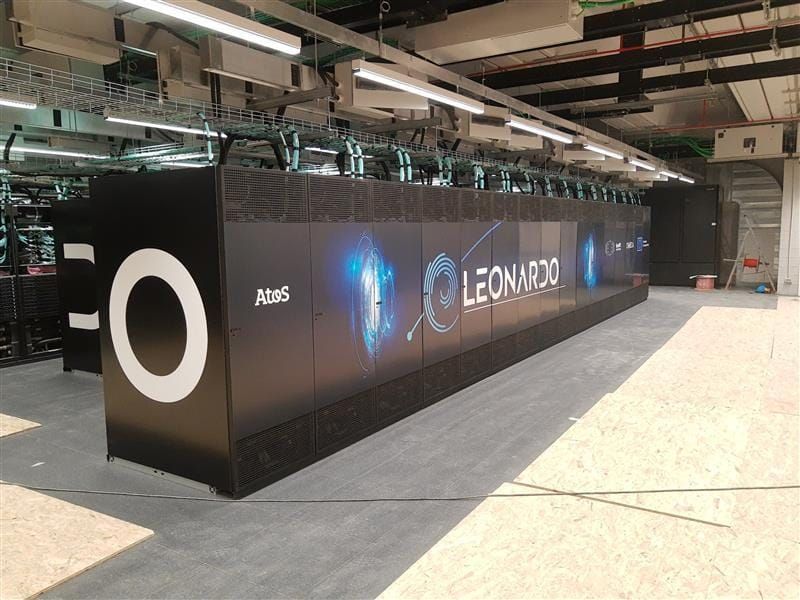top500

With a measured High-Performance Linpack (HPL) performance of 174.7 petaflops, the supercomputer LEONARDO, hosted by CINECA and jointly funded by EuroHPC JU and the Italian Minister of University and Research, reached the 4th position on the latest release of the Top500 list of the fastest supercomputers in the world, as announced at the SC22 conference in Dallas, Texas on November 14, 2022.
This milestone rewards CINECA’s 50-year commitment to supporting research through HPC, and confirms Italy’s role as a strategic asset in the building of the European HPC ecosystem.
Leonardo will be inaugurated with a ceremony that will take place on November 24, 2022 in Bologna – Italy.
TECHNICAL INFORMATION
The Leonardo system is supplied by Atos, based on BULL SEQUANA XH2000. Leonardo is composed by two main computing modules: a Booster module, that was deployed in October 2022, which purpose is to maximize the computational capacity through NVIDIA Ampere based GPUs, and a Data Centric module, that will be ready in 2023, aiming to satisfy a broader range of applications via Intel Sapphire Rapids CPUs. The booster module just released reached a HPL of 174,7 petaflops. Not all the Leonardo system has been used. In fact, Cineca and Atos expect to improve the Leonardo performance till 240 Petaflops HPL during the next weeks.
While co-designing a powerful and efficient architecture to support researchers, also the issue of the sustainability has been evaluated. All the technological solutions used were evaluated also from the point of view of their environmental impact, in particular, the technologies used for cooling the supercomputer and the datacenter rooms.
THE EUROHPC ECOSYSTEM TO SUPPORT RESEARCH
The European supercomputer Leonardo located in the Technopole of Bologna, is one of the three pre-exascale systems of the EuroHPC Joint Undertaking (EuroHPC JU). The project is part of the actions that European Union has been implementing to support the spread of High Performance Computing as a driving force for growth and innovation. In fact, 50 percent of the computing power generated by Leonardo will be available to Italian research institutes and universities; the remain will be used by European researchers.
ACCESS TO LEONARDO
The pre-production phase of the supercomputer has already begun. The LEAP call (Leonardo early access program) is aimed at projects that are expected to have a high scientific impact and can exploit an extremely wide availability of computational resources. Researchers from all sectors of science, industry, and the public sector can submit their proposals, regardless of their nationality. The selected projects will have access to the system from January 2023. Leonardo will become fully operational for users in late MARCH 2023.
STATEMENTS
Anders Dam Jensen, Executive Director of the European High Performance Computing Joint Undertaking (EuroHPC JU), commented:
Two EuroHPC supercomputers ranked amongst the world’s four most powerful supercomputers is a strong testimony to the fact that EuroHPC Joint Undertaking is delivering on its objectives. LUMI and Leonardo are both top-of-the range pre-exascale systems, and will be available to European research and industry to innovate and improve citizens’ quality of life, while further supporting Europe’s digital sovereignty.
Francesco Ubertini, President of Cineca stated:
Cineca is very proud about Leonardo’s Top500 ranking. This milestone rewards Cineca’s 50-year commitment to supporting research through HPC and confirms Italy’s role as a strategic asset in the building of the European HPC ecosystem. It is an honor to share this success with the EuroHPC JU members. Supercomputers like Leonardo are capable of providing the computer power needed to model, simulate, and thus help to understand complex phenomena. Leonardo will enable scientific breakthroughs and technological innovation thus helping to face our society’s most difficult challenges, among which the mitigation and management of risks due to extreme situations, from pandemics to natural events like earthquakes, tsunamis, volcanic events, or flash floods – many of which can be caused by climate change.
David Vannozzi,CEO of Cineca declared:
Cineca has a long history, since its foundation in 1969, in supporting research with the most powerful supercomputers in the world. The strong partnership with the EuroHPC initiative today lead to this great achievement, a significant step forward in the field of computational sciences. The ultimate goal is to strengthen the European presence in high performance computing, a strategic asset to promote the technological growth of the EU Member States. Supercomputing is today a decisive booster in economic competition, and beyond. Leonardo’s applications can be made available to the political decision-maker in real time. What is already happening in the field of medical-scientific research, to face Covid-19, can also be repeated in other fields. The ambitions of applying supercomputing are limitless. Today we have laid the foundations to enter the fourth industrial revolution and “re-read” reality, to modify it, through supercomputing.
Sanzio Bassini, Director of Cineca’s HPC Department commented:
The Leonardo pre-exascale system will provide the scientific community with significant advances in the computational field, in line with Cineca’s HPC story. The measured performance refers to a fraction of 70% of the whole system, confirming the high value of the achievement. The Leonardo system, unlike the high-end HPC system ranked in the Top500, is designed to mainly provide European and Italian public and private researchers with a high-productivity HPC system, capable of sustaining high-end performance, as demonstrated by the ranking of the system in the top position of the Top500 at worldwide level.







